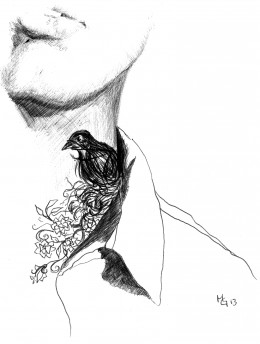
In a constantly changing world, what can you hold on to for the rest of your life?
It’s impossible to have a sophisticated conversation about tattoos without taking into account the questions they raise about permanence, art, perception and class.
We express ourselves in increasingly ephemeral and fluid ways. A status update from last week is irrelevant, ancient history. Tweets roll in and out of our psyches as Instagram photos pass before our eyes, noticed and forgotten in a breath.
Take Snapchat, the epitome of short-lived messaging — popular solely for how it allows users to send transient, self-deleting photos. Social media sites beg us to constantly reload, reload, reload.
Tattoos force us to stay. Stay put, they say. Focus. Take me in; I will be here awhile.
And that’s certainly part of the appeal of getting inked. If you decide to get a tattoo, you’re making a commitment, the effects of which could very well extend throughout and beyond your life.
Our Release section this issue features the stories of six students’ tattoos. All of them, and many other students, have significant meaning attached to their body art. For some, tattoos are a way to commemorate a lost loved one. For others, particularly meaningful lines from literature or songs may merit inscription in flesh.
Religious beliefs also inform the way many students feel about tattoos. A popular myth claims that a tattoo disqualifies someone from being buried in a Jewish cemetery.
While traditional Jewish values and law strongly discourage Jews from getting tattoos, the idea that a tattoo prevents one from being buried in a Jewish cemetery has no basis. Even the most Orthodox Jews will admit that this myth is a common misconception.
Some students, in fact, have tattoos that express elements of their faith.
As students, we’re also concerned about the stigma associated with tattoos in the workplace. While tattoos may have once been veritable markers of rebelliousness or even depravity, they are becoming more and more common, and we expect negative associations to drop away with time. Not to mention, a few years down the road, it will be our generation doing the hiring.
We doubt a surgeon with a half sleeve would remove an appendix less skillfully than one without tattoos. The connotation is slowly dissipating that ink represents a “lifestyle,” or that it says anything about who someone is or the quality of work he or she is capable of producing. That said, we do encourage our fellow job-seekers to be judicious in considering their tattoo placement. Does your prospective ink pass the “business casual test” — that is, could office attire cover your tattoo if necessary?
If so, as far as we’re concerned, your body is your own. The decision of if or how to mark it is yours alone. Make it count, make it real, and in a world of four-second Snapchats and fleeting statements, don’t be afraid to make it permanent.


